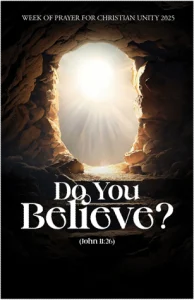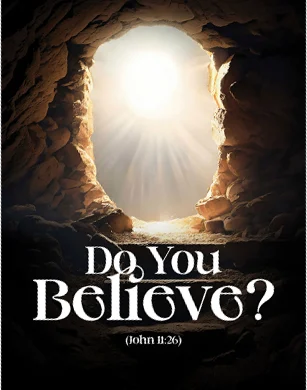SCRANTON – Faithful throughout the Diocese of Scranton will join with members of various Christian congregations of northeastern Pennsylvania for an Ecumenical Celebration of God’s Word on Wednesday, Jan. 22, 2025, at 12:10 p.m. in the Cathedral of Saint Peter.

All people of goodwill are invited to participate in the celebration highlighting the annual Week of Prayer for Christian Unity which takes place from Jan. 18-25, 2025.
The observance of the Week of Prayer for Christian Unity carries added significance this year, because 2025 marks the 1,700th anniversary of the First Ecumenical Council of Nicaea in Turkey.
The council, which began meeting in May 325 AD, gave birth to the Nicene Creed, affirmed the full divinity of Christ, and set a formula for determining the date of Easter.
The Most Rev. Joseph C. Bambera, Bishop of Scranton, will serve as leader of prayer for the traditional ecumenical prayer service at the Cathedral of Saint Peter. Bishop Bambera is once again serving as Chairman of the U.S. Bishops’ Committee on Ecumenical and Interreligious Affairs.
Homilist for this year’s prayer service is Father Scott P. Sterowski, Diocesan Coordinator for Ecumenism and Interfaith Relations, who took over that role on Sept. 1, 2024. Father Sterowski also serves as Pastor of Blessed Sacrament Parish, Throop, and Holy Cross Parish, Olyphant.
The Ecumenical prayer service will be broadcast live at 12:10 p.m. on CTV: Catholic Television of the Diocese of Scranton. It will also be made available on the Diocese of Scranton website, YouTube channel, and across all diocesan social media platforms.
The theme of the 2025 Week of Prayer for Christian Unity is based on a text from the Gospel of John: “Do you believe this?” (John 11:26). The theme takes its cue from the dialogue between Jesus and Martha when Jesus visited the home of Martha and Mary in Bethany following the death of their brother Lazarus.
Using this year’s theme, the Week of Prayer for Christian Unity provides a unique opportunity to reflect on and celebrate the common faith of Christians.
Prayers and reflections for the week have been prepared by the brothers and sisters of the monastic community of Bose in northern Italy. Using information jointly prepared and published by the Dicastery for Promoting Christian Unity and the Commission on Faith and Order of the World Council of Churches, additional information on this importance of this year is highlighted below.
THE COUNCIL OF NICAEA
Convoked by the Emperor Constantine, the Council of Nicaea was attended, according to tradition, by 318 Fathers, mostly from the East. The Church, having just emerged from hiding and persecution, was beginning to experience how difficult it was to share the same faith in the different cultural and political contexts of the time.
Agreement on the text of the Creed was a matter of defining the essential common foundations on which to build local communities that recognized each other as sister churches, each respecting the diversity of the other.
Disagreements had arisen among Christians in the previous decades, which sometimes degenerated into serious conflicts. These disputes were on matters as diverse as: the nature of Christ in relation to the Father; the question of a single date to celebrate Easter and its relationship with the Jewish Passover; opposition to theological opinions considered heretical; and how to re-integrate believers who had abandoned the faith during the persecutions in earlier years.
FROM 325 to 2025
Although the Council of Nicaea decreed how the date of Easter should be calculated, subsequent divergences of interpretation led to the feast frequently being marked on different dates in the East and West. Though we are still awaiting the day when we will have a common celebration of Easter annually, by coincidence, in this anniversary year of 2025, the great Easter feast will be celebrated on the same date by the Eastern and Western churches.
The meaning of the saving events which all Christians will celebrate on Easter Sunday, April 20, 2025, has not changed with the passage of seventeen centuries.
The Week of Prayer for Christian Unity is an opportunity for Christians to explore afresh this living heritage and re-appropriate it in ways that are in keeping with contemporary cultures, which are even more diverse today than those of the Christian world at the time of the Council of Nicaea.
